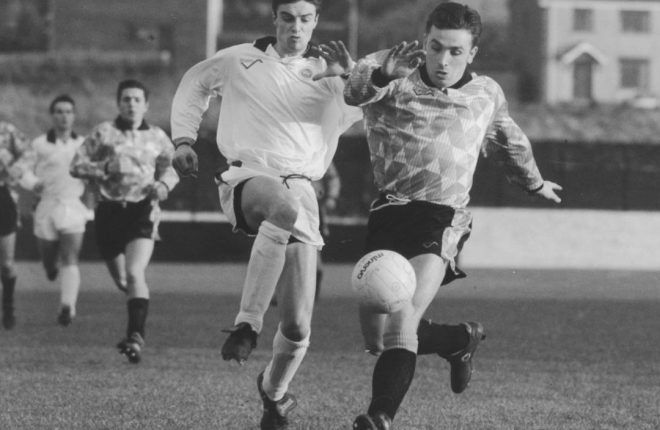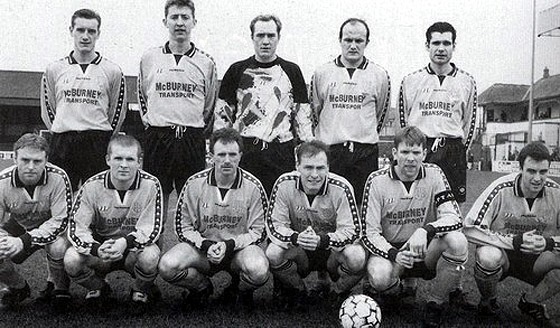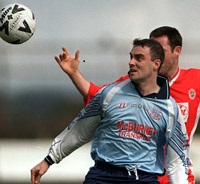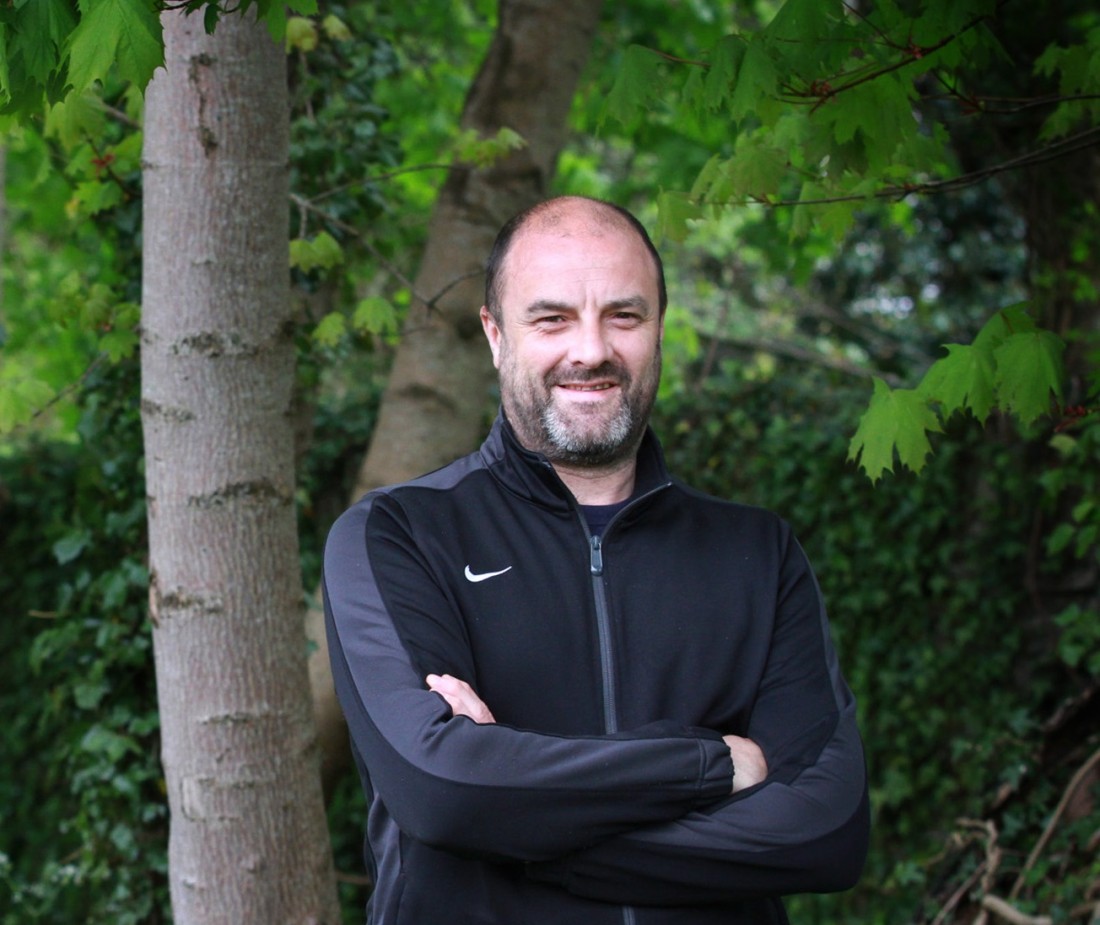By Ciaran O’Donnell
Barry Patton doesn’t do regrets. Doesn’t do hard luck stories either. That said, the decision by Finn Harps to release him at the beginning of his senior career still rankles almost 30 years on.
In 1990, Barry Patton was a 17-year-old who was fast making a name for himself at Finn Park. He’d represented the Irish schools on five occasions, scoring twice, and was named FAI International Schools’ Player of the Year for the 1989/1990 season. Chris Rutherford was in charge of the Harps first team and the St Columba’s College student was part of the reserve set-up. Once the chance of automatic promotion ended, Rutherford left and was replaced by Alex Harkin.
“Alex went to promote myself and Damien Devine up the first team squad. Harkin had me at Harps under-15 and Donegal Schoolboys. I would have to say the biggest influence on my career was Alex Harkin. He didn’t say a lot as a manager, but any titbits he did give to me stuck with me. He always encouraged me and always told me I had the ability,” Barry says.
Harkin had huge belief in the Lifford teenager and gave him his Finn Harps debut against Kilkenny at Buckley Park when bringing him on as a substitute on March 3, 1990. He’d only turned 17 a couple of months earlier.
“We were losing 2-0. He brought me on and I scored. I was only told recently that I am still the youngest player ever to score for Finn Harps and that is a record that is still standing after 30 years.
“There was talk that Raymond Foy was the youngest scorer, and there was the same talk when BJ Banda scored the winner against Limerick in the promotion play-off tie in 2015. But when they went back on the records they realised I was actually younger. I haven’t won a lot in football, but I am proud of that record.”
The Harps teenager had attracted the attention of Aston Villa in 1991 and spent a week on trial at Villa Park where Ron Atkinson had taken charge a number of weeks earlier.
Barry’s departure from Navenny Street in October, 1992, wasn’t something he’d planned. Or wanted. He believed he had potential and dearly wanted an opportunity to become a long-serving Harps favourite and follow in the footsteps of Brendan Bradley and Con McLaughlin. John O’Neill succeeded Harkin before Patsy McGowan returned for another stint at the helm and became Patton’s third manager at Finn Park.
“Patsy came to me and said the board had come to him saying that the squad needed to be cut from 17 players to 16. I wasn’t getting any big fortune back then – we were getting peanuts to be honest. If Patsy really wanted to keep me, I think he could have pushed the boat out a bit and done so,” he opines.
“It was between myself and Con McLaughlin. Con was nearing the end of his career and I was starting out in mine. It was a straight fight between Con and myself and Con won because I was let go.”
After being released on a Tuesday night, Barry was all set to sign with Fanad United. His father, Tommy, had played for Ulster Senior League side and Barry was happy to do the same.
“The following night I got a call from Paul Kee who was Roy McCreadie’s assistant at Omagh Town. He heard I’d been released and wanted to know if I’d go up to play for Omagh reserves on the Thursday night. I don’t remember much about that game, but I must have done something because I went straight into the first team on the Saturday against Cliftonville.”
His striking partner up front was Liam Coyle.
While Barry’s confidence had taken an understandable rattle, he was prepared to knuckle down and work hard at his new club. Playing up top with the hugely talented Liam Coyle made the move a whole lot easier.

Patton playing for Omagh Town
“If you made a run, Liam would give you the ball and I always thought I could finish. Liam and myself both scored that day and we won 2-1. I never looked back after that. Liam Coyle was, without doubt, the best player I ever played with. He was amazing. I don’t know how he managed to do things he did. He had the greatest knack of losing his markers, and all of a sudden he would have all the time and all the space,” he says.
Coyle went back to Derry City and Omagh replaced him with Gary Beckett from Derry City.
“Gary and myself hit it off, too. I scored 18 goals the first season with Liam and 17 the second season with Gary.”
Roy McCreadie left Omagh and was succeeded by Paul Kee. Ballymena United then came in with a bid for the Donegal striker.
“I wanted to make a step up and better myself and I teamed up with Johnny Speake in attack at Ballymena United. Playing with Liam Coyle, Gary Beckett and Johnny Speake, I was playing with the best players in the North West, if not the best players in the country.”
Barry thoroughly enjoyed his six years at the Ballymena Showgrounds where he was managed by Tommy Jackson who signed him, Alan Frazer and Nigel Best. It was a well-supported club that drew big crowds. Barry notched up 75 goals in over 200 appearances and helped the club to the First Division title on 1997, having placed runners-up the year before.
“The following season we were going really well and were top of the Premier League at Christmas. I had scored 22 goals before Christmas. I signed a new three-year contract but only hit four more goals for the remainder of that season. They just dried up,” he recalls.

The Ballymena United team that led the Premier League at Christmas during the 1997/1998 season. Back row, from left, Glenn Hunter, Jason Allen, Robbie Beck, Declan McGreevy and Mark Carlisle. Front row, from left, Phillip Knell, Nigel Boyd, Stephen Stewart, Peter Murray, John McConnell and Barry Patton.
“Ballymena at that time were going for the league and signed Glenn Hunter from Crusaders who was top goalscorer in the Irish League. I think they might have paid £20,000 for him.”
Hunter had scored 157 goals in 296 appearances which was a club record at Crusaders before it was broken by Jordan Edwards in 2016.
“Me and Hunter couldn’t hit it off and didn’t hit it off.”
Ballymena plummeted from first to sixth. A season that promised so much ended in massive disappointment.
On the final day of the season, Ballymena relegated Ards to the First Division, but missed out on a top half finish by just one goal. Barry picked up the player of the season award. Earlier in the season, he’d been linked to a move to League of Ireland champions, Derry City – Felix Healy was keen to take him to the Brandywell.
2000 saw the goal-getter return to Omagh Town who were back under the guidance of Roy McCreadie for a second spell.
“They were attracting good players like Marty McCann and James Quigley, and Barry Curran was there as well. I went back to Roy and I had a couple more good seasons at Omagh.”
But his travels still hadn’t come to an end. Cliftonville boss, Marty Tabb, tabled an offer which would bring the centre forward to Solitude who had expressed an interest before he left Ballymena. He signed a two-year deal with the Belfast club in January, 2003. By the end of the year, The Reds were CIS League Cup Champions after defeating Larne in a penalty shoot-out (5-4) at Windsor Park. It was their first trophy for five years and provided Barry with a welcome winner’s medal.
But the joy of that success was short-lived. During a subsequent training session, he felt a sharp pain in his groin.
“At that time all the talk was of this ‘Gilmore’s groin’. I thought it was nothing more than that. I thought I’ll get an operation and I’ll be back playing again.”
He was referred to the Northern Ireland team doctor who sent him for an x-ray. The doctor’s advice to the player was blunt and to the point.
“Retire,” he told me. “It was as simple as that.”
“He asked me if I had children and I said I had. He said if I wanted to play football with them I’d need to retire. I had very bad arthritis in the leg.”
At 31, it was a devastating diagnosis. In truth, he knew he wasn’t the same player he was. He wasn’t as mobile and thus, wasn’t as lively.
His final move saw him team up with his former manager, Roy McCreadie, for a third time at Newry in January, 2004.
“I went to Newry, but I really struggled. I stayed there for about six months. But it just fizzled out and I had to call it a day,” he says.
In 2007, he had a consultation with orthopaedic surgeon, Peter O’Rourke at Letterkenny Hospital.
“He did a full hip replacement. That’s 13 years ago. 15 years is the most you’ll get from a new hip, so I’m looking at second replacement soon,” he reveals.
“I literally couldn’t put my shoes on – that’s the reason I went to see Mr O’Rourke. I couldn’t lift my leg, such was the pain with the arthritis. All I wanted to do was have a normal life, never mind play football. I just wanted to get myself organised and be able to go for a walk. I haven’t kicked a ball since that.”
Barry had envisaged playing to well into his thirties before he was diagnosed with severe arthritis.

Barry Patton during his playing days.
“Arthritis is in the family. My mother and my uncles have it and they are very bad with it.”
Barry found it hard to deal with life without football. Football was what he loved. It’s also what made him tick.
“All I wanted to do was play football and all I ever knew was football. I wanted to play it every day of the week. I was totally devastated with this news. My way of dealing with it was try not to think about it. I just put it out of my mind.”
Barry reckons he’s scored around 160 goals during his senior career.
“I suppose it’s a good enough return. What people don’t realise is that you’re not all the time in the first team. At Ballymena I was fighting to stay in the team because they were always signing players. The records might show you have 200 appearances, yet 50 of those might be coming off the bench.”
Inevitably, perhaps, the conversation meanders full circle and back to where it all started.
“I reckon if Harps had stuck with me, I could have scored goals for them. That’s the biggest disappointment for me. I was a Harps supporter and used to torture my father to take me up to Finn Park on a Sunday. He was a great man for keeping me grounded.
“I supported Harps. My girlfriend at the time, Carolyn Meehan, now my wife, was from Stranorlar and I used to walk across the town and play for Harps. As a young fella that’s all I wanted to do,” he stresses.
John O’Neill managed him in between Alex Harkin and Patsy McGowan. While he wasn’t a fan of O’Neill back then, his take on the former Northern Ireland international has changed since.
“John O’Neill was good for me looking back. At the time I didn’t like him. He used to play me on the wing and said I was too light for up front. He wanted me to get to know the game. John O’Neill was ahead of his time with the professional things he was introducing. Looking back, he was trying to make be better. What he was saying was right,” he comments.
“For McGowan to let me go I have to say was devastating for a young fella for whom the only thing that mattered was Harps.”
Barry still keeps tabs on the Harps, but doesn’t attend games these days. In 2017, he was assistant to Finn Harps under-17, manager, Declan Boyle.
“It was nice to be asked and I’m good friends with Declan. It was a big commitment. I was getting lifted in Lifford at nine o’clock in the morning, going to a game in Dublin and wasn’t getting back to eight o’clock that night. I thought it might have been good for me to get back involved in football. But when the year was over, I was glad to walk away. It was a big commitment and nothing beats playing.”
Barry says Ollie Horgan and Paul Hegarty are doing a good job at Finn Park.
“It still seems to be a financial struggle to keep the club afloat. In fairness to the two boys they’re keeping them up or getting them back up again if they go down.
“My love for Harps sort of died the day Patsy let me go, to be honest. I look out for results, but I just wouldn’t have the same passion as I had for them when I wanted to stay at the club and help it succeed,” he explains.
“They let me go before I even hit my prime. It still annoys me. I think I got a raw deal. Football is all about opinions. Patsy didn’t fancy me and that’s fair enough. He might have thought he did right. But in my opinion, he did wrong.”
Barry Patton will always forgive.
But will never forget.










